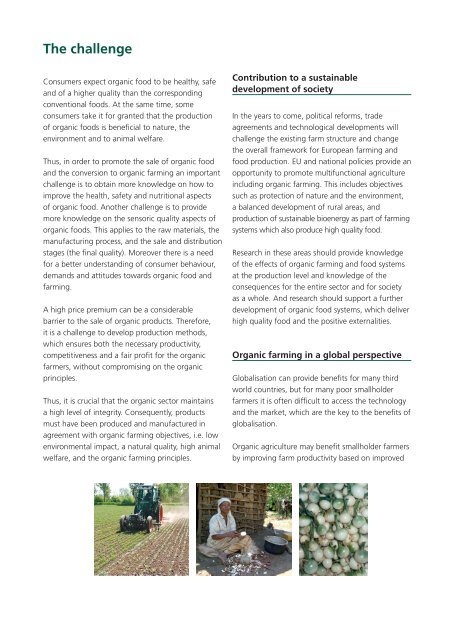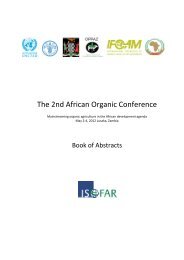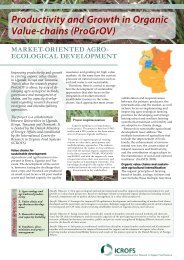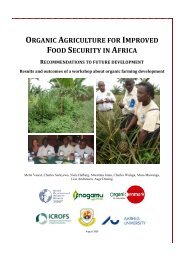darcof iii - ICROFS
darcof iii - ICROFS
darcof iii - ICROFS
Create successful ePaper yourself
Turn your PDF publications into a flip-book with our unique Google optimized e-Paper software.
The challenge<br />
Consumers expect organic food to be healthy, safe<br />
and of a higher quality than the corresponding<br />
conventional foods. At the same time, some<br />
consumers take it for granted that the production<br />
of organic foods is beneficial to nature, the<br />
environment and to animal welfare.<br />
Thus, in order to promote the sale of organic food<br />
and the conversion to organic farming an important<br />
challenge is to obtain more knowledge on how to<br />
improve the health, safety and nutritional aspects<br />
of organic food. Another challenge is to provide<br />
more knowledge on the sensoric quality aspects of<br />
organic foods. This applies to the raw materials, the<br />
manufacturing process, and the sale and distribution<br />
stages (the final quality). Moreover there is a need<br />
for a better understanding of consumer behaviour,<br />
demands and attitudes towards organic food and<br />
farming.<br />
A high price premium can be a considerable<br />
barrier to the sale of organic products. Therefore,<br />
it is a challenge to develop production methods,<br />
which ensures both the necessary productivity,<br />
competitiveness and a fair profit for the organic<br />
farmers, without compromising on the organic<br />
principles.<br />
Thus, it is crucial that the organic sector maintains<br />
a high level of integrity. Consequently, products<br />
must have been produced and manufactured in<br />
agreement with organic farming objectives, i.e. low<br />
environmental impact, a natural quality, high animal<br />
welfare, and the organic farming principles.<br />
Contribution to a sustainable<br />
development of society<br />
In the years to come, political reforms, trade<br />
agreements and technological developments will<br />
challenge the existing farm structure and change<br />
the overall framework for European farming and<br />
food production. EU and national policies provide an<br />
opportunity to promote multifunctional agriculture<br />
including organic farming. This includes objectives<br />
such as protection of nature and the environment,<br />
a balanced development of rural areas, and<br />
production of sustainable bioenergy as part of farming<br />
systems which also produce high quality food.<br />
Research in these areas should provide knowledge<br />
of the effects of organic farming and food systems<br />
at the production level and knowledge of the<br />
consequences for the entire sector and for society<br />
as a whole. And research should support a further<br />
development of organic food systems, which deliver<br />
high quality food and the positive externalities.<br />
Organic farming in a global perspective<br />
Globalisation can provide benefits for many third<br />
world countries, but for many poor smallholder<br />
farmers it is often difficult to access the technology<br />
and the market, which are the key to the benefits of<br />
globalisation.<br />
Organic agriculture may benefit smallholder farmers<br />
by improving farm productivity based on improved





